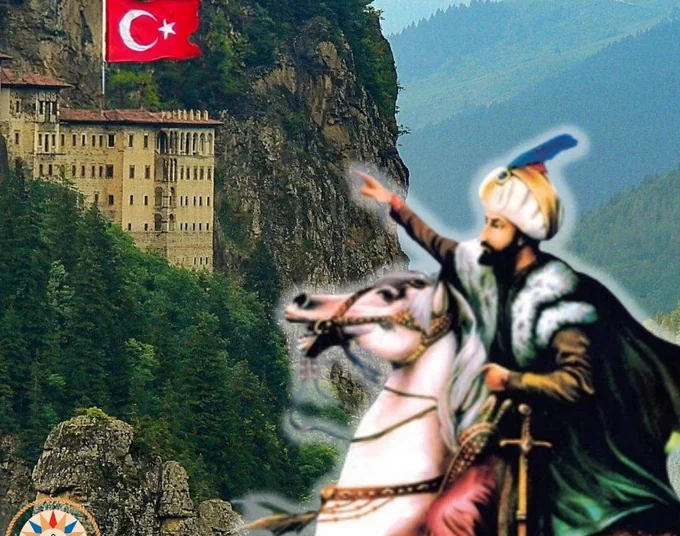Levent Kenez/Stockholm
Nationalist and Islamist groups have launched a campaign to obstruct the annual ritual of the Assumption of Mary, organized by the Ecumenical Patriarchate in İstanbul, which will take place on August 15 at Sümela Monastery in the northeastern Turkish province of Trabzon. Leading the campaign are close associates of Turkish President Recep Tayyip Erdogan, while nationalist and Islamist associations are also lending their support.
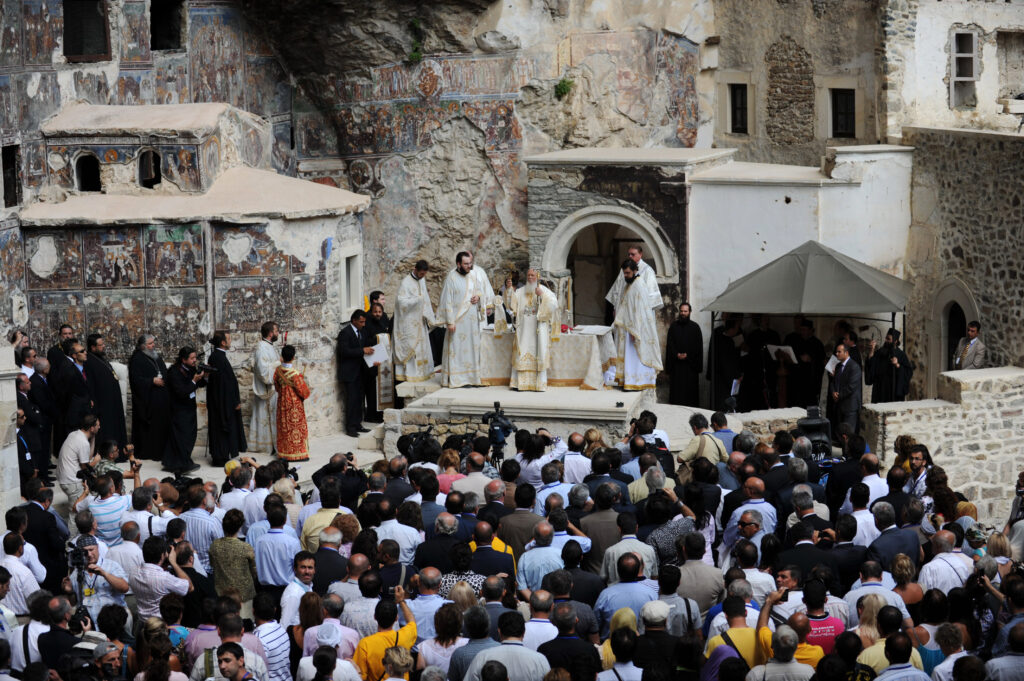
This year marks the 10th occurrence of the ceremony since 2010. It was notably aligned with a series of reforms concerning minority rights, integral to the Erdogan administration’s pursuit of European Union membership at the time.
Due to the restoration of Sümela Monastery between 2015 and 2019, there was a hiatus of four years in the observance of the ritual, resuming once again in 2020.
Retired admiral Cihat Yaycı, who leads the Turkish Maritime and Global Strategies Center, has launched a campaign to revoke the permit issued by the Trabzon Governor’s Office for the ceremony. On August 3 a tweet from the center’s official account contained derogatory language directed at Ecumenical Patriarch Bartholomew I, the spiritual leader of Eastern Orthodox Christians worldwide, along with claims that holding the ceremony violates the Treaty of Lausanne, an international agreement signed in 1923 that defined borders and established peace between Turkey and the Allied Powers, including Greece, after World War I.
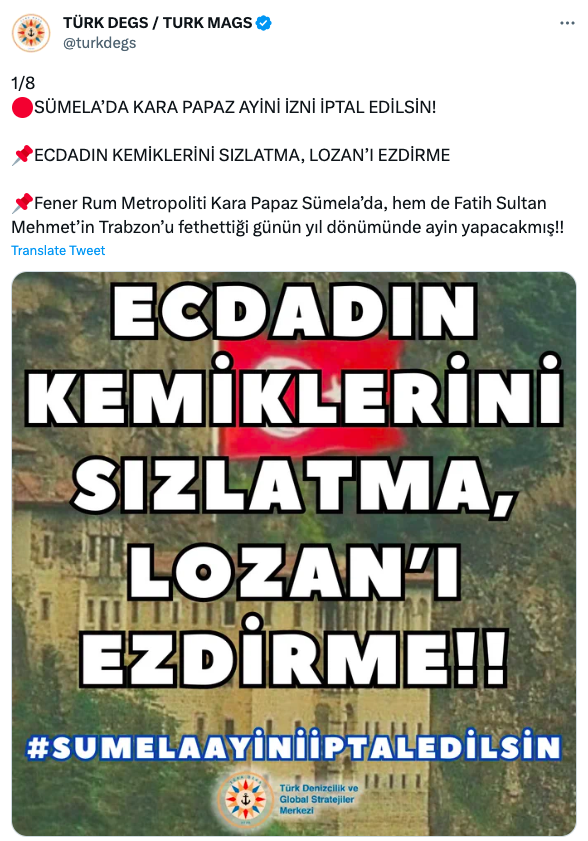
Pointing out that August 15 commemorates the anniversary of the Ottoman conquest of Trabzon, the statement contended that the ceremony would be interpreted as disrespect towards the country’s Ottoman ancestors. It alleged that the ritual’s objective was to either erase or cast doubt on the history of Trabzon’s conquest, thus advancing the narrative that these lands originally belonged to Greece.
The statement further said, “The purpose of this ceremony is to obliterate the memory of Trabzon’s conquest or, at the very least, cast a shadow over it, thereby promoting the ambitions of the Megali Idea.”
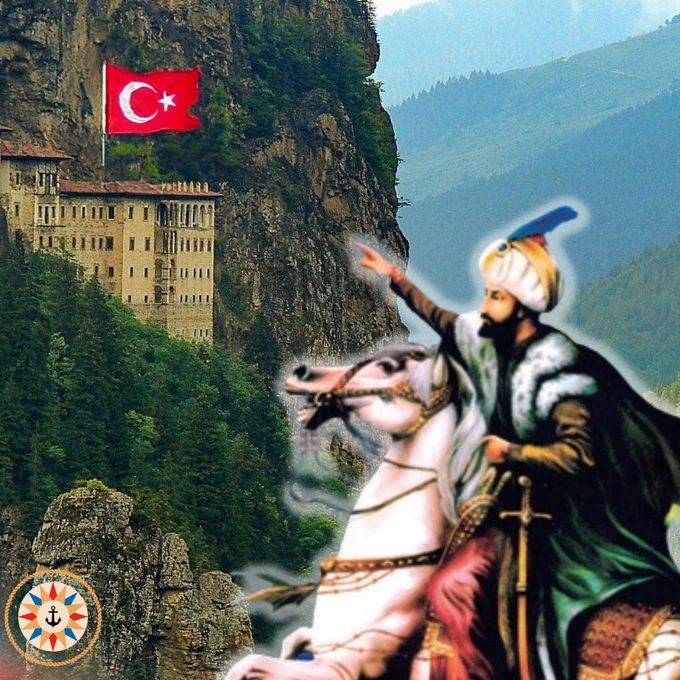
The Megali Idea is a nationalist plan aiming at setting up a Greek state in line with the former borders of the Byzantine Empire.
Yaycı is among the close associates of President Erdogan. He was with Erdogan during an unsuccessful coup attempt on July 15, 2016 and was heard whispering to Erdogan during the president’s televised address on CNNTürk that night. After the abortive putsch, Yaycı played a crucial role in the purge of Erdogan opponents and pro-NATO officers from the military. He is also the developer of software called “Fetometre,” which was employed to identify members of the Gülen movement, a group critical of Erdogan.
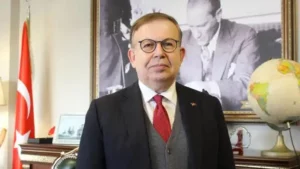
However, according to the software he himself developed, Yaycı also received a score indicating his affiliation with the movement.
He is also a strong supporter of a controversial doctrine called Blue Homeland, which is based on Turkey’s interests in the Mediterranean.
Metin Külünk, a prominent figure within the ruling party and a childhood friend of President Erdogan, provides the most substantial support to Yaycı’s campaign. He was affiliated with Islamist terrorist group the Great Eastern Islamic Raiders Front (İslami Büyük Doğu Akıncıları Cephesi, İBDA/C or IBDA-C) according to documents obtained by Nordic Monitor in 2021.
Külünk functioned as one of the key operatives who provided money to a right-wing gang called Osmanen Germania in Germany to purchase weapons, organize protests and target critics of the Turkish leader. He was also involved in supporting the Union of International Democrats (UID), which acts as the long arm of Erdogan in Europe.
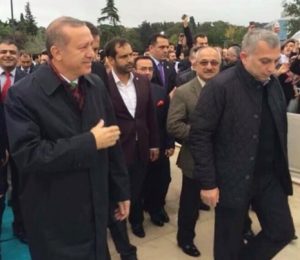
Külünk on August 6 expressed his concerns on Twitter, highlighting the necessity of reconsidering the permit for the ceremony at Sümela. He pointed out the potential involvement of Greek intelligence and the unrealistic ambitions associated with the event, urging caution.
“Our highly mature diplomatic stance has been emboldening those who seek to undermine Turkey through Greece. Moreover, there are recent indications that, in collaboration with the United States, they [the Greeks] are becoming increasingly active in our Çeşme district, going to great lengths to prevent us from even accessing our own shores,” Külünk wrote
Radical Islamist figure Mehmet Metiner, a former ruling party lawmaker and former advisor of President Erdogan, retweeted Yaycı’s posts with a message aimed at attracting Erdogan’s attention to the content.
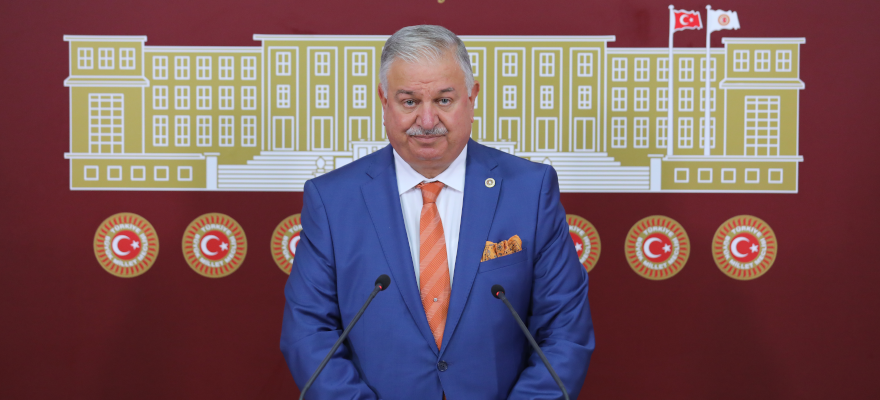
Doğan Bekin, an Istanbul deputy representing the far-right Islamist New Welfare Party (Yeniden Refah Partisi), a partner of the government, during a press conference in parliament on Monday voiced opposition to the the ceremony at Sümela Monastery on the 562nd anniversary of Trabzon’s conquest, claiming that it couldn’t be coincidental. According to Bekin, the actions of Bartholomew, whom he referred to as a “so-called” ecumenical patriarch, amounted to a de facto violation of the terms of the Treaty of Lausanne. This is because, according to the treaty, the privileges of the Greek Patriarchate were abolished, and only the title of “Archbishop” should be used.
So far, the government does not seem to regard the requests for the cancellation of the ceremony with a significant level of concern.
In a statement to the state-run Anadolu news agency, Koray Koçhan, the mayor of Maçka, the district in Trabzon where Sümela Monastery is located, indicated that preparations, under the coordination of the Trabzon Governor’s Office, have been finalized for the upcoming ceremony.
Koçhan emphasized that all necessary measures have been taken to ensure the smooth progression of the ceremony. “All arrangements have been completed to address the security, accommodation, transportation and potential health concerns of the participants. Our institutions have cooperated to ensure a peaceful and secure environment for the ceremony, aiming to avoid any organizational issues. Just like every year, this year’s guests coming to Sümela will be able to conduct their rituals without encountering any problems,” he said.
Koçhan clarified that no extraordinary measures had been taken in connection with the ritual, saying, “As in previous years, participating groups will gather to carry out their activities here. We are taking the necessary precautions within the historic building to ensure the safety of our visitors. This way, our guests can engage in their activities peacefully and securely before departing. We are expecting around 300 to 400 people to attend this year.”
During the ceremony at Sümela, aside from invited guests, tourists are not permitted to enter the monastery.

